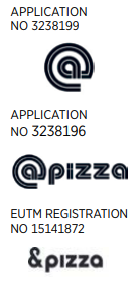

Posted: 01/02/2019
At Pizza Ltd filed two new UK applications for signs (shown below) covering clothing, footwear and headgear in class 25; various non-alcoholic beverages in class 32; restaurant and similar services in class 43; and, in the case of the @pizza mark, various pizza- and non-pizza-related goods in class 30.

On 29 September 2017, ImaPizza LLC filed oppositions against both applications under sections 3(1)(a) and/or 3(1)(b) of the Trade Marks Act 1994 in respect of all the goods and services applied for. It alleged that the widespread use of the @ symbol on social media and in email addresses rendered the sign non-distinctive. The opposition against the @pizza mark also asserted that the word 'pizza' was inherently non-distinctive and (under section 5(2)(b) in respect of classes 30, 32 and 43) alleged likelihood of confusion with ImaPizza’s senior EU trade mark registration No 15141872 for the &pizza mark in classes 30 and 32. Neither party filed evidence.
Following a hearing on 3 August 2018, the examiner dismissed all absolute grounds objections under sections 3(1)(a) and 3(1)(b). The examiner held that the @ symbol was a sign capable of distinguishing the origin of any goods or services (and not just those covered by the specifications, which was the question under section 3(1)(b)). This is consistent with the registry’s general practice of accepting applications comprising individual characters or numerals.
Regarding section 3(1)(b), the examiner disagreed that the general public would perceive the @ symbol as functional, highlighting the opponent’s failure to provide evidence supporting its assertion. It also noted that the goods and services in question were not electronic goods or services, where the @ symbol would typically be used in a technical or functional manner.
Further, the examiner found that the stylisation of the @ mark provided more than a mere “figleaf of distinctiveness” (referencing Arnold J’s comments in Starbucks v BSB). The presence of the distinctive @ element was therefore sufficient to render both the @ mark and the @pizza mark inherently distinctive, even in relation to pizza-related goods and services.
The opposition to the @pizza mark under section 5(2)(b) was partially successful in relation to non-pizza-related goods in class 30 and all class 32 goods.
Finally, in relation to section 5(2)(b), it is worth noting that the &pizza mark did not cover pizza or pizza-related goods and services (EUIPO having previously refused registration of these on absolute grounds). As such, and despite holding that the @pizza mark and the &pizza mark were similar to a medium/above medium degree, the examiner held that there was no likelihood of confusion in relation to the dissimilar pizza-related goods and services covered by the @pizza mark. The opposition was, however, upheld in relation to the similar non-pizza-related goods in classes 30 and 32.
This article was published in CITMA in January 2019.